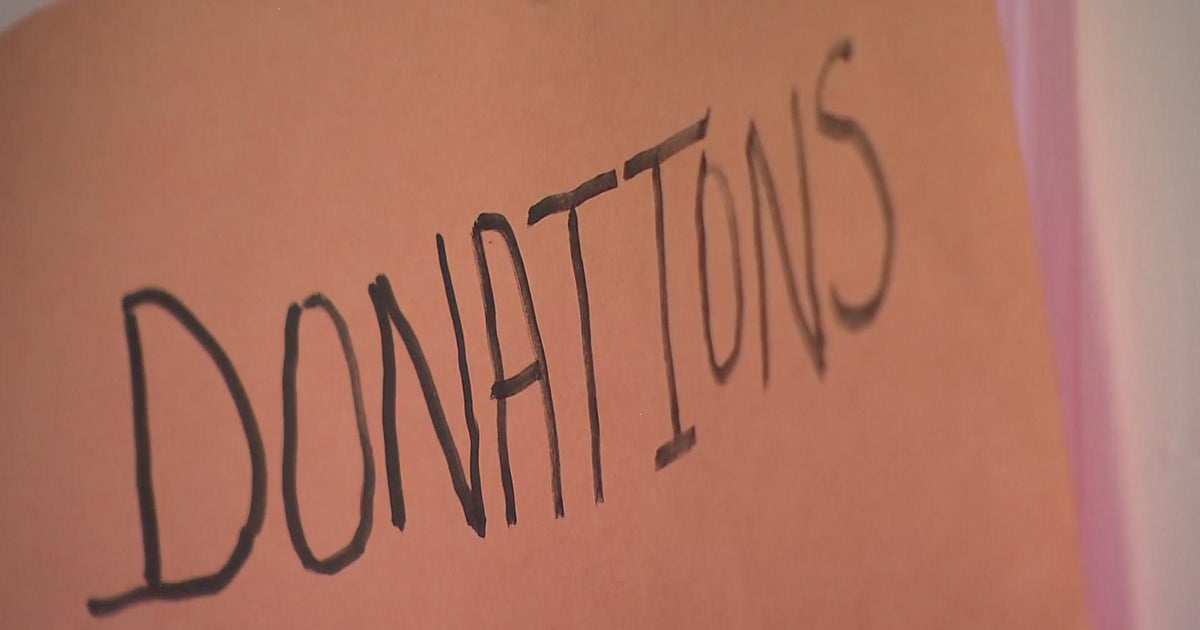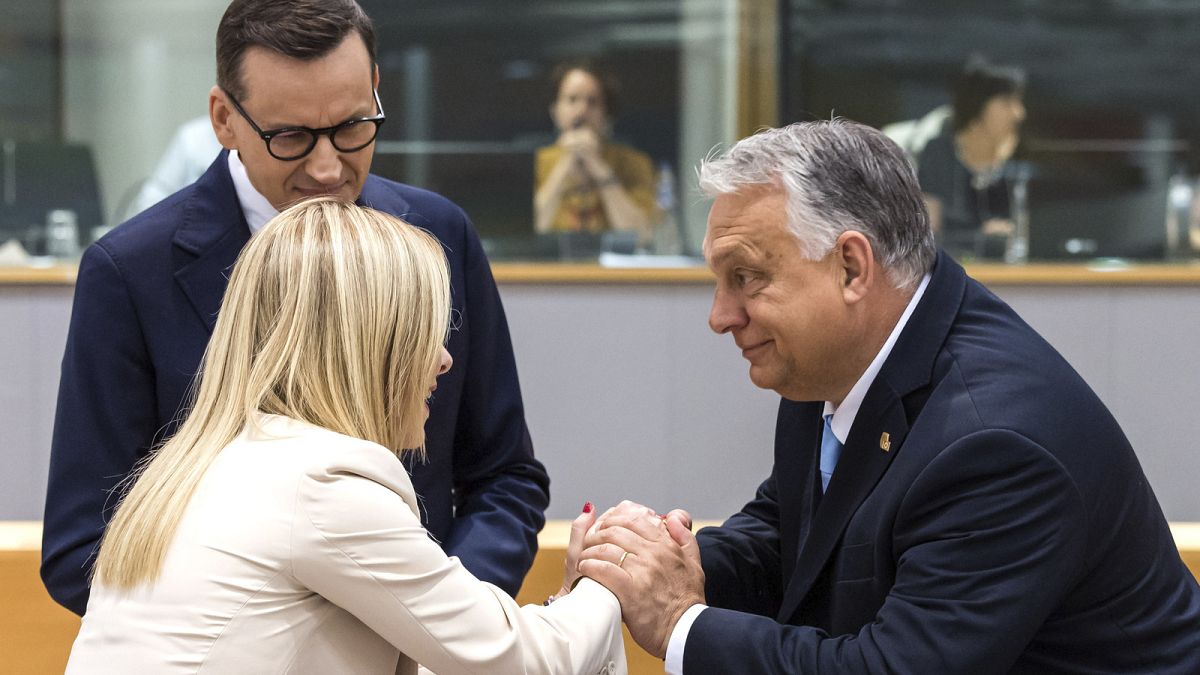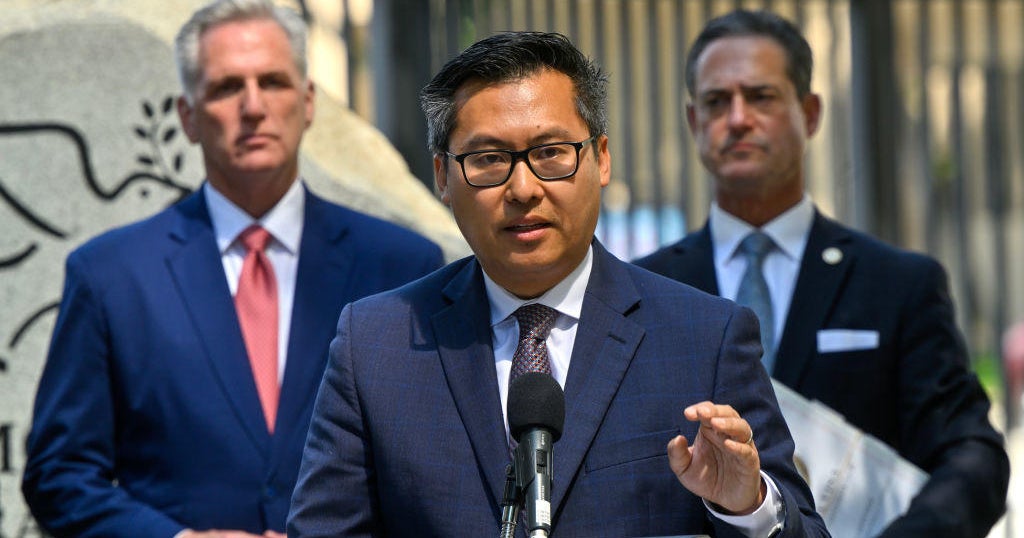Denver, CO
City of Denver asking for more help to support migrants who arrive in the city

Watch CBS News
Be the first to know
Get browser notifications for breaking news, live events, and exclusive reporting.

Denver, CO
Demonstrators at University of Denver gather at pro-Palestinian encampment amid order to leave

Hundreds of people gathered at a pro-Palestinian encampment at the University of Denver on Tuesday after an email from the university asked encampment participants to leave by 9 p.m.
By 9:30 p.m., CBS News Colorado footage shows hundreds of people gathered at the Cargenie Green near the center of campus, many holding Palestinian flags or signs expressing solidarity with the Palestinian people.
Around 7 p.m., the university sent an email to students and faculty with that 9 p.m. deadline to clear out of the encampment.
“We’ve lost confidence that the encampment can continue without further compromising operations and safety for all campus members. At an extended and productive meeting with encampment participants today, we informed them that the camp must close and asked them to clear the area voluntarily by 9:00 p.m. on May 21,” the email says, in part. “We have offered our support to the encampment participants as they safely remove belongings. If participants choose not to voluntarily leave, the University will determine appropriate action to disband the camp. We have also offered our support to identify other safe avenues of free expression.”
Around 9:50 p.m., a small number of counter-protesters appeared, at least one of whom was waving an Israeli flag.
The university sent an updated statement from Chancellor Jeremy Haefner and Provost Mary Clark around 10 p.m. to students and faculty:
“As you are likely aware, there is a large demonstration at the encampment site. During our meeting with the encampment student representatives today, we articulated multiple times that there were no plans to have police or campus safety dismantle the encampment tonight. We shared our desire to resolve this through a voluntary and cooperative approach. It was our expectation that the encampment would be dismantled by 9 p.m. and our interactions with the encampment participants indicated that was realistic to expect. We are disappointed that this is not what has happened and that participants chose this path forward, which is serving only to further threaten campus safety and operations. In the days ahead, University officials will determine the next steps in moving toward the disbandment of the camp. It is our continued expectation that all encampment participants be affiliated with DU as a current student, faculty, or staff member.”
Organizers with the group DU for Palestine did not immediately respond to a request for comments about the demonstration Tuesday night, but on May 9, when they launched the encampment, they issued demands to the university.
In that statement, the organization asked the university to disclose its investments, divest from companies “invested in and responsible for the illegal occupation, apartheid, and genocide of Palestinians,” boycott Israel economically and academically, publicly acknowledge “the ongoing genocide of Palestinians,” call for a ceasefire and “protect free speech on campus.”
A similar encampment at Auraria Campus, which had been up for about three weeks, was vacated on Saturday.
Denver, CO
More than 500 flights delayed at Denver International Airport for thunderstorms

More than 500 flights are delayed at Denver International Airport on Tuesday as thunderstorms hinder arriving flights, according to flight data and the Federal Aviation Administration.
There were 504 delayed and 11 canceled flights as of 3:15 p.m., according to the flight tracking website FlightAware.
Arriving flights are delayed by an average of 51 minutes because of thunderstorms, according to the Federal Aviation Administration.
Severe thunderstorms dropped baseball- and softball-sized hail on the Eastern Plains on Monday, and intermittent storms are forecast through this week, National Weather Service forecasters said Tuesday.
This is a developing story and may be updated.
Get more Colorado news by signing up for our Mile High Roundup email newsletter.
Denver, CO
The Disconnect That Led to the Denver Nuggets’ Demise

The back-to-back championship dream is over for Denver Nuggets players, fans, and coaches. But for their general manager, going back-to-back was never the biggest priority.
“I just want dudes that we try to develop, and it’s sustainable,” Nuggets GM Calvin Booth told me last August. “If it costs us the chance to win a championship this year, so be it. It’s worth the investment. It’s more about winning three out of six, three out of seven, four out of eight than it is about trying to go back-to-back.”
This quote is from a feature published on opening night about the Nuggets’ hopes of building a dynasty. There was real optimism that Nikola Jokic could power the Nuggets to back-to-back titles, making them the first team to do it since the Warriors did it in 2017 and 2018. Denver was the clear favorite to win it all again, despite losing two key rotation players in Bruce Brown and Jeff Green to free agency. But only rookies and journeyman vets were added to plug in the gaps. With the new collective bargaining agreement presenting massive team-building challenges for teams that are well over the luxury tax, adding young players felt like a reasonable approach. But the Nuggets’ lack of depth was the one hole critics could poke in its case to run it back.
And ultimately, that’s what did the Nuggets in. Denver ran out of gas Sunday, blowing a 20-point lead in the second half at home in Game 7 and losing to the Minnesota Timberwolves. Only one bench player logged more than 10 minutes and the Nuggets had five players under the age of 25 ride the pine the entire game. This was a theme all season, not just in the playoffs. On multiple occasions throughout this campaign, Michael Malone, the fiery head coach of the Nuggets, lamented his team’s lack of steady depth.
“That’s the challenge when you have so many young, unproven players off the bench,” Malone said in late November after an early-season loss to the Rockets. “But we also have games to win, and that delicate balance is a tightrope. But we need to win, and I’m gonna play the guys that are gonna help us get a win.”
Booth and Malone had different approaches to the season that often clashed. Booth was investing in the future, and Malone was thinking entirely about the present. And in the end, nobody won. The Nuggets failed to advance to the conference finals and the rookies didn’t get developmental time they needed. Booth’s plan could still work out in the long run if his draft picks improve. But with the Nuggets already planning their summer vacations, it looks like he whiffed on a valuable chance to win it all again.
Malone had nobody on the bench he believed he could trust, even as Jokic and the Nuggets looked exhausted in the second half of Game 7. The rotation lacked a steady shot-creator in the backcourt besides Jamal Murray, with 34-year-old Reggie Jackson being the only veteran option. Michael Porter Jr. couldn’t find his shot all series, but only journeyman Justin Holiday got chances behind him. Second-year wing Christian Braun was the only youthful contributor. And there was no reliable big man to play behind or alongside Jokic, with DeAndre Jordan as the only veteran on the bench. Minnesota looked longer, quicker, and deeper all series.
“I think they’re built to beat us,” Jokic said after Game 7. “Just look at their roster. They have basically two All-Stars, two probably first-team defensive players, Mike Conley, who is the most underrated player in the NBA. … From the bench, they have a [Sixth Man of the Year]. They have Kyle [Anderson] and [Nickeil Alexander-Walker], who was really good for them. They are one team that can do literally everything. They can be big, or small.”
Jokic’s comments had to sting for Booth and the Nuggets, especially when considering that ex-Nuggets GM Tim Connelly is the one who drafted Jokic, built the roster around him, then left for the Timberwolves to construct a title hopeful shaped to defeat his own creation. Maybe the Nuggets had to lose this season for Booth and Malone to get on the same track long term. But all season, Denver lacked organizational alignment, a worrisome reality for a franchise that just won its first title with a historic player who’s still in his prime and who this season won his third MVP in four years.
Putting the blame solely on Booth would be an error, though. Booth also added Kentavious Caldwell-Pope the prior offseason, and his first rookie class of Braun and Peyton Watson proved to be fruitful. Braun made pivotal plays as a rookie on Denver’s way to a title, which carried over to this season. Watson didn’t play meaningful minutes as a rookie but flashed excellent two-way abilities this season before his lack of a reliable jumper led to his benching against the Timberwolves. The three rookies Booth drafted this year—wing Julian Strawther, guard Jalen Pickett, and forward Hunter Tyson—were all upperclassmen that he hoped would play during the season and then be ready for rotation minutes come the playoffs. Just like Braun last year. But for one reason or another, it didn’t happen.
Here’s what Booth told me over the summer in a quote that didn’t make my opening-night story, after I asked if Braun’s minutes increasing throughout the 2022-23 season was a template for the 2023-24 rookie class: “I think Malone will have to play them. Hunter and Julian, these guys can manufacture points on their own. And I like the balance between Jamal and Jalen, who has been basically Joker Lite wherever he’s been. What happens when Jalen goes out there with Jokic and the ball’s moving around with both of those guys? It’s going to be like San Antonio with Boris Diaw.”
Things didn’t pan out as expected, though. Strawther shot only 29.7 percent from 3 in his 545 regular-season minutes. Pickett appeared in only 122 minutes, sharing the floor with Jokic for just 35 and with Murray for none. Tyson played only 48 minutes, even fewer than Nuggets players on two-way contracts, despite excelling in the G League. Instead, Malone played four of his five starters even more minutes than they did last season (only Murray didn’t, due to his injuries). Malone valued pursuing home-court advantage over managing minutes and distributing playing time to younger players, and it ended up not mattering in the end with Denver losing three home games to Minnesota.
“We played until June last year,” Malone said after Game 7. “We had to play our main guys through Game 82 [this season] to secure the no. 2 seed, whereas last year we were able to rest down the stretch. The run last year, coming back, the amount of minutes our starters had to play, I think emotionally and physically, our guys are gassed.”
So where do the Nuggets go from here to get their dynasty hopes back on track? Maybe most importantly, Booth and Malone need to get on the same page moving forward. The truth is blame and credit are both shared between them. Malone has been in Denver longer than anyone else in the organization, and was critical in the rise of Jokic and in the construction of a system that won a title. But he also should’ve played the kids more to find out whether they could contribute in the playoffs while not running his tired starters into the ground. Booth put the perfect final touches on the team that Connelly built, but knowing Malone’s tendency to favor veterans, and knowing the uncertainty of rookie production, he also could’ve done better than bringing in Jackson, Jordan, and Holiday as the only vets off the bench.
The pressure this summer is undoubtedly on Booth, though. Malone inked a long-term extension in November through the 2026-27 season. Jokic is signed through 2027-28. Meanwhile, Booth’s contract is up after the 2024-25 season, according to a new book from Nuggets reporter Mike Singer. Josh Kroenke and the rest of Nuggets ownership need to consider whether they should reward Booth with an extension despite their leadership’s lack of a shared direction.
No matter who’s in charge, the job of an NBA GM is more complex than ever. The choice to just pay every player and make a bunch of trades isn’t as clear-cut as it once was, because of the severe restrictions the new CBA places on teams over the luxury tax. The first luxury tax apron is $7 million above the salary cap, and the second apron is $17.5 million above it. Teams over the salary cap’s first apron are not allowed to:
- Acquire a player via sign-and-trade;
- Sign players using the biannual exception;
- Sign players using more than the taxpayer midlevel exception;
- Sign players waived during the season if their salary exceeds the non-taxpayer midlevel exception.
Teams over the second apron have even more punitive restrictions:
- Cash can no longer be used in trades;
- Trade exceptions from prior years can’t be used in deals;
- Players can’t be acquired in a sign-and-trade;
- Outgoing salaries can’t be combined in trades;
- Cannot sign players using the taxpayer midlevel exception;
- First-round picks seven years out cannot be traded;
- If a team remains in the second apron for three out of five seasons, its first-round pick is automatically moved to the end of the round.
Denver was over the second apron this season and is set to exceed it again next season. And the roster is about to become even more expensive. Caldwell-Pope will be an unrestricted free agent in high demand as a knockdown 3-point shooter who also belongs on an All-Defensive team. Any of the eight teams that can create over $20 million in cap space this summer could realistically target him: If the Sixers whiff on Paul George, could KCP be their next target? Why wouldn’t the Spurs want a 3-and-D veteran next to Victor Wembanyama? Isn’t KCP a perfect fit for Orlando’s needs? Up and down the line, Caldwell-Pope can fit anywhere.
One year from now, Murray will be up for a max extension and Aaron Gordon can become an unrestricted free agent who would also have a significant market. It can be assumed that Murray will get a max extension, which means Caldwell-Pope and Gordon would have to combine for roughly $45 million at most for Denver to retain its starting five. That might be too optimistic of a projection for the Nuggets, considering they got priced out of retaining Brown and Green last summer.
More immediately, the Nuggets must worry about retaining KCP. If he’s re-signed to a deal worth around $15 million annually, the Nuggets could get under the second apron by trading away one of Jackson or Zeke Nnaji, and replacing them with a minimum salary. If KCP’s contract is over $20 million annually, then both would have to go (and possibly Vlatko Cancar, depending on other moves). Losing KCP would be a big problem, but it can’t be ruled out with elite 3-and-D players in such high demand.
“This new CBA was appropriate. The second apron was appropriate,” Booth told me before the season. “That’s another reason why we got three rookies.”
And more could be on the way. The Nuggets have the 28th and 56th picks in this year’s draft, which is deep with quality role players. By necessity, Booth needs to invest in young players or else he’ll be handcuffed in detrimental ways. Malone has no choice but to get on board, because the supporting veterans won’t necessarily get any better than they were this year. Booth needs those young players to be hits, though, or he’s going to have to do better at scraping the bottom of the barrel for vets.
“You’re always looking at ways to get better,” Malone said after Game 7. “And that’s what we’ll do.”
The issue is that Booth has so few levers to pull. Even if the Nuggets get under the second apron, they’ll still feel the restrictions of the first apron. They don’t have cap space. They can only trade firsts in 2024 and 2031. Their young guys didn’t improve enough to have much trade value. Front office executives described Booth’s trade negotiations before the deadline as someone who went shopping but left their wallet at home on purpose. It was also a thin trade market: Would moving a rookie for Kelly Olynyk really have made sense? Odds are they couldn’t have outbid the Raptors for him anyway, or made a better offer than the Suns did for Royce O’Neale. Could trading multiple seconds for Andre Drummond really have moved the needle? Perhaps, if it bought Jokic a few minutes to catch his breath. But there wasn’t much out there.
Moving forward, the Nuggets may need to get creative with trades to solve their problems. One card Booth could play is trading Porter Jr., who is about to enter the third year of a five-year, $179.3 million deal. He’s still only 25 years old and appears to be past his injury concerns after missing only 21 games the past two seasons. And he’s certainly one of the league’s best shooters. But he’s expensive, he doesn’t create his own shot off the dribble, and he’s inconsistent on defense. Maybe it’d make sense for the Nuggets to trade Porter for two players, giving them more depth while retaining shooting prowess. Because for the second consecutive year, MPJ’s production fell off a cliff in the playoffs. Last season, Porter averaged 12.3 points on 11.4 shots per game on just 32.7 percent shooting from 3 over the final three rounds. This year, he was even worse in the second round, averaging 10.7 points on 10 shots on 32.5 percent from 3. Porter was also more productive on defense last year. Porter’s health could still be a red flag to some teams, but his youth, shooting prowess, and theoretical upside in an expanded role makes him Denver’s most valuable expendable asset, its clear out to an expensive roster in need of reinforcements.
The problem with even considering trading MPJ is that the Nuggets have already devalued 3-point shooting as is. Most of their draft picks have been inconsistent or low-volume threats from the perimeter at the collegiate level, which has carried over to the NBA in the case of Braun, Watson, and Strawther. And as a team, the Nuggets ranked dead last in 3-pointers attempted this season. Any acquisitions moving forward need to be able to shoot reliably.
“Conventional wisdom says that best players help the role players, but in reality it’s a two-way street,” Booth told me last summer. “The best role players help the best players out. They make the best players better.”
Ultimately, Jokic found himself overwhelmed by Minnesota. Whether it was Karl-Anthony Towns contesting every move, Rudy Gobert looming nearby, or Naz Reid stepping up when he needed to, Jokic faced relentless pressure from a cadre of long arms. And the lack of sharpshooters around him meant he often faced double-teams, swarmed by the Timberwolves with strategic precision.
“I consider the San Antonio Spurs a dynasty, and they never won back-to-back,” Malone said following Game 7. “So losing, the hurt of it, the pain of it, helped win our [first] championship. Can we 1716304990 use this year, too?”
The Nuggets will need to. But there is no guarantee they ever make it back to the Finals. Anthony Edwards is still on the rise. The young Thunder are gaining momentum. The Mavericks and Wolves aren’t going anywhere. And Wembanyama is way ahead of schedule. The Nuggets already caught a glimpse of Wemby’s impact when he led a comeback victory over the Nuggets in his season finale, a loss that dropped Denver to the 2-seed in the West. The game was just a hint at future showdowns in a Western Conference landscape that is only getting tougher.
Once the architect behind the Nuggets, Connelly drew up a new blueprint to take them down. Now, it’s Booth’s turn to adjust the roster, follow through on his original vision, and chase his dream of a Nuggets dynasty.
-

 News1 week ago
News1 week agoSkeletal remains found almost 40 years ago identified as woman who disappeared in 1968
-

 World1 week ago
World1 week agoUkraine’s military chief admits ‘difficult situation’ in Kharkiv region
-

 Movie Reviews1 week ago
Movie Reviews1 week agoAavesham Movie Review
-

 World1 week ago
World1 week agoCatalans vote in crucial regional election for the separatist movement
-

 Education1 week ago
Education1 week agoVideo: Protesters Scuffle With Police During Pomona College Commencement
-

 World1 week ago
World1 week agoEU's divided right wing can disrupt if it finds greater unity: experts
-

 News1 week ago
News1 week agoNevada Cross-Tabs: May 2024 Times/Siena Poll
-

 News1 week ago
News1 week agoControlled demolition planned at Baltimore bridge collapse site

















